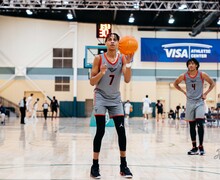Prepare for local internship fair, research employers, dress appropriately
To distinguish yourself from other students and stand out to potential employers, preparation is key.
On Wednesday, approximately 95 organizations will be at the Panasci Lounge in the Schine Student Center from 11:00 a.m. – 2:30 p.m. as part of the local internship fair. Among them will be representatives from JetBlue Airways, NewsChannel 9 WSYR, the Salvation Army and the U.S. Air Force.
In order for students to make a good, professional first impression, Syracuse University offers services to assist students searching for employment opportunities. Jennifer Pluta, the internship coordinator at SU Career Services, and Bridget Lichtinger, assistant director at the Tina Press & David Rubin Career Development Center said there are a number of techniques students can use to get noticed by employers.
First and foremost, students should prepare and research. This can be done by going to OrangeLink and checking the list of employers who will be attending the conference, Lichtinger said.
“You need to do your homework; you do not want to go in cold,” she said.
Additionally, Lichtinger said students should “have conversations” with the representatives. But to do this well, she said students must be knowledgeable about the organizations they are interested in working for.
Pluta said one of the most important things students can do is get their résumés critiqued by career services beforehand.
Chantelle Mendonsa, a junior political science and policy studies major, said she took that advice after her first internship fair.
“Although I did not get my résumé critiqued at the time, I have since then. This has helped a lot because it is currently more specific to what I want to do,” Mendonsa said.
Lichtinger also said a great way of preparing what to say to an employer is through practice.
Imelda Rodriguez, an undeclared sophomore in the David B. Falk College of Sport and Human Dynamics, went to the career fair last year to gain more information on different companies and to get an idea of how career fairs work. Lichtinger encourages people to do this as practice and to get a feeling of the surrounding environment.
A lot of the fair is about presentation, including things as subtle as a résumé’s paper weight, said Lichtinger. When the student is done speaking to a potential employer, the only thing that an employer will have left is a student’s résumé, so it should look presentable.
“It is all about how you are portraying your professional image,” Lichtinger said.
Both Lichtinger and Pluta also stressed the importance of wearing appropriate attire. A suit and tie are not expected, but business casual — dress pants or a skirt and a button-down shirt — is ideal, they said.
And of course, there are questions to avoid. Pluta said the worst thing a student can do is ask the employer what they do, or what company they are recruiting for.
“The employers are going to be so put off by that. They are going to know that you did not do any research — which is probably the case — and that you are going to be wasting their time,” Pluta said.
It is also important to build a network. Following up, even a week or two later, is the best way to for students to conclude their experience. Students can connect with employers through LinkedIn — but be personal — or by collecting business cards and email addresses, said Lichtinger.
Lastly, Lichtinger said students should avoid being a “swag hog” — students who cruise from table to table grabbing free items such as pens and mugs.
Said Lichtinger: “You go in with a focus about networking and having a conversation, not just going in and getting free stuff.”
Published on September 17, 2013 at 9:07 pm





